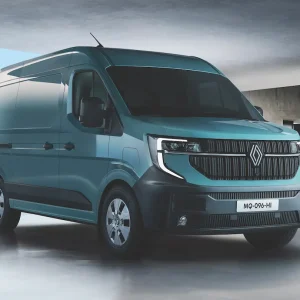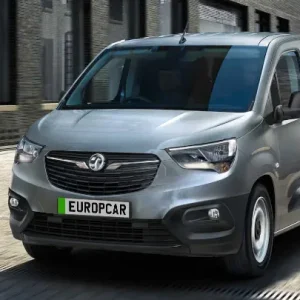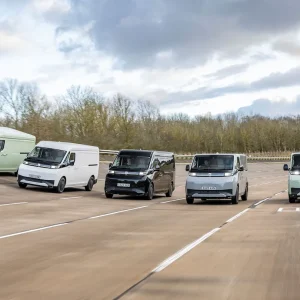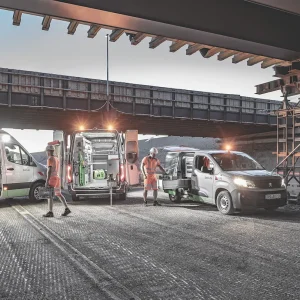Whilst most van buyers spend plenty of time making sure they get the best deal, be it through online research or by just calling in to their local dealerships and haggling, for those not leasing their new van or pick-up, choosing the best method of disposal (balancing the hassle factor with the best financial return) isn’t so straightforward.
Let’s get it straight: you really don’t have to worry about vehicle disposal if you lease your van because it’s all taken care of. But many LCV users still want to buy and ultimately own their van, preferring the flexibility of term and mileage, and not having to worry too much about being charged for the odd bump, scratch, scuff and scrape at the end of the contract, which are bound to happen to a hard-working van.
Larger companies will usually choose the easiest option and send their vehicles straight to auction, possibly after being defleeted with some damage being repaired and the corporate vinyl livery being removed. It’s a broad-brush approach that’s necessary because to dispose of each vehicle individually would be a costly administrative burden.
For the smaller business, there are plenty of avenues available.
Dealer part-exchange
Nice and easy: you drive your old vehicle in and drive away in the new one. There’s no downtime or complications with insurance because you temporarily own two vehicles. The dealer will settle off any outstanding finance agreement (built into the deal) and, unless you’ve deliberately somehow defrauded the dealer, there will be no comeback. Downsides? You’ll be offered a trade valuation, unless the dealer uses some of their margin and bonus to ‘over-allow’ and inflate the figure. You’d probably be able to negotiate this sum as a discount if you had no vehicle to part-exchange, so you’re still getting a return that reflects what the trade value of the vehicle at (usually, at the most, an estimate of what it may realise at auction) is.
Auction
Not a route often used for disposal by the smaller business, auction has the advantage that your van will be exposed to a large number of trade (and some retail) buyers, both physically in the auction hall and increasingly online. It will find its true (usually trade) value and, upon a successful sale, you’ll receive the proceeds within a few days. Once sold there is no comeback from an unhappy buyer, even if the van breaks down when being driven away. It’s worth bearing in mind, though, that you’ll be competing with vehicles offered by the major leasing companies, and trade buyers bid with confidence on these, knowing that service history and provenance will all be present. You’ll need to consider auction fees (usually both an entry fee and a percentage of the sale value) and also decide what to do if the vehicle fails to sell. Do you wait another week and try again, or do you withdraw it and try some other avenue? There are the logistics of moving it around, and also the fact you may have to wait for the sale proceeds to come through before being able to buy your new van.
Buying Services
Some of these services have become household names now, advertised on TV by celebrities. An online valuation is followed by a visit to an appraisal centre where a firm offer is made. Once agreed, funds follow quite rapidly. While one of the easiest methods of disposal, it is likely to reap the lowest reward as the valuations are usually below the expected auction return (this is where these companies make the majority of their money).
Dealer outright purchase
It’s worth a phone call to a few dealers, especially if your old van is desirable, in good condition, not too old and with average or low mileage. They’re always looking for stock and may be prepared to pay well for a vehicle they think there is a demand for. Don’t expect to get anywhere near the prices they are advertising similar vehicles for – they’re in business to make a profit and also need to allow for preparation costs.
Private sale
Likely to provide the best return, but with by far the most potential for hassle, it’s fraught with pitfalls. You’ll need to decide how much to advertise it for. The best guide is to see what similar vehicles are on offer for from private sellers on portals such as Auto Trader and Ebay. On placing the ad you’ll need to deal with incoming enquiries (probably of variable quality) and requests to view the van. Potential buyers will want to drive the van, with associated insurance issues, and, depending on the seriousness of their interest, haggle to a varying degree. You’ve then to arrange payment and, prior to the vehicle being collected, you’ll need to settle any existing finance agreement. During all of this, you might be waiting to collect your new van and sale funds may be dependent on this.
Although, legally, a private buyer usually has no recourse, this doesn’t stop many trying to claim that the vehicle has faults that they weren’t aware of and wanting financial compensation or even a refund. These days, more and more people choose to avoid a private sale, the hassle not being worth a few hundred (or even thousand) extra pounds.
Whichever of the routes you decide to go down it’s worth making sure the van is clean inside and out before anyone, trade or otherwise, views it. Documents are vital, as are spare keys, satnav SD cards, and the service history. All these things can affect the strength of any offer.





